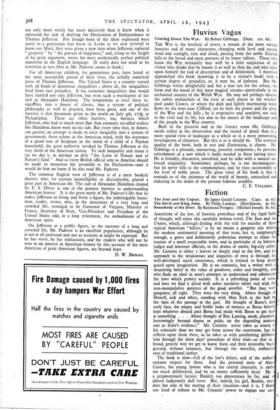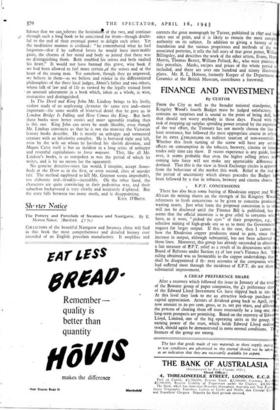Fiction
The Just and the Unjust. By James Gould Cozzens. (Cape. 9s. 6d.) The Devil and King John. By Philip Lindsay. (Hutchinson. 9s. 6d.) Somebody at the Door. By Raymond Postgate. (Michael Joseph. 8s. 6d.)
AMATEURS of the law, of forensic procedure and of the legal habit of thought will enjoy this carefully written novel, The 7usi and the Unjust, which, although dealing with the trial for murder of three typical American " killers," is by no means a gangster tale within the modern sentimental meaning of that term, but is, surprisingly enough, a grave and deliberately pedestrian attempt to relate the routine of a small respectable town, and in particular of its lawyers, judges and lawcourt officials, to the drama of exotic, big-city crime. Mr. Cozzens is either a lawyer or deeply read in the law, and his approach to the weaknesses and iniquities of men is through his well-developed social conscience, which is trained to keep sharp guard upon imagination. He is no romantic, but a writer with a despairing belief in the value of goodness, order and integrity, and who finds an ideal in men's attempts to understand and administer the laws which protect society. It is a refreshing point of view, and here we find it allied with sober narrative talent and with the non-manipulative patience of the good novelist. "But they were gangsters, all right. They were the very thing. Abner thought of Howell, sick and white, standing with Max Eich in the hall by the bars of. the passage to the gaol. He thought of Basso's dark surly face, the empty and feeble looks of menace as Basso bitterly kept whatever absurd pact Basso had made with Basso to get back at something . . . Abner thought of Roy Leaning, meek, placatory, harrowingly beyond shame or pride, on the degrading anxious seat as State's evidence." Mr. Cozzens never takes us nearer to his criminals than we may get from across the courtroom, but he reflects upon them there, as he takes us with unrelenting delibera tion through the three days' procedure of their trial—so that in broad, generic way we get to know them and their miserable back ground, without intimacy, but through the merciful, unflurrie' eyes of traditional justice.
The book is slow—full of the law's delays, and of the author' extreme respect for these. And the personal story of Abne Coates, the young lawyer who is the central character, is rathe' too much deliberated, and by no means sufficiently lived. He a preposterously laconic Hamlet, too deprecatory by far, and a' almost ludicrously dull lover. But, indeed, his girl, Bonnie, over does her side of the muting of their situation—and it is, I thin one kind of tribute to Mr. Cozzens' power to engage our coil
fidence that we can tolerate the hesitaticnit of the two, and continue t through such a long book to be concerned for them—though doubt- ful to the end of their eventual power to delight each other. Yet the meditative manner is civilised: " he remembered what he had forgotten—that if he suffered losses he would have inestimable gains, the charms of her mind and body so joined that there was no distinguishing them. Both troubled his senses and both exalted his heart." It would not have harmed this grave, wise book if we had been allowed to feel more certain .of the senses and of the heart of the young man. Yet somehow, though they go unproved, we believe in them—as we believe and rejoice in the differentiated philosophies of the three local judges, Abner's father and two others, whose talk of law and of life as viewed by the legally trained form an unusual adornment in a book which, taken as a whole, is wise, instructive and distinguished.
In The Devil and King John Mr. Lindsay brings to his lively, violent study of an unplcasing z.haracter the same zest and—more important—the same wealth of histo-ical detail that he gave us in London Bridge Is Falling and Here Comes the King. • But both those books were better stories and more agreeable reading than is this one. King John can never be made likeable, even though Mr. Lindsay convinces us that he is not the monster the Victorian history books describe. He is merely an unhappy and tormented creature with an inferiority complex. He is betrayed right and left, even by the wife on whom he lavished his slavish devotion, and Magna Carta itself is but an incident in a long series of unhappy and resentful capitulations to force majeure. This, like all Mr. Lindsay's books, is as outspoken as was the period of which he writes, and is by no means for the squeamish.
No genuine detective-story fan would, I imagine, accept Some- body at the Door as in the first, or even second, class of murder
tale. The method employed to kill Mr. Grayson seems improbable, too elaborate and—frankly—incredible. On the other hand, the characters are quite convincing in their pedestrian way, and their suburban background is very clearly and accurately &splayed. But the story falls between too many stools, and is disappointing.
KATE O'BRIEN.



























 Previous page
Previous page